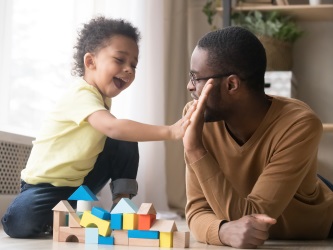Parenting tips for dads during the COVID-19 crisis
Looking for ways to take care of your kids during this challenging time without pulling your hair out? Parenting and fatherhood expert Carolyn Dayton has compiled the following helpful tips and resources for fathering during this challenging time.
 Keep them busy
Keep them busy
- Kids love to explore and play, and busy kids are happy kids! Find creative ways to keep them busy and active with games and activities.
- Inside the house, try board games, card games, arts and crafts, and pretend play games. You can also search the web for creative activities or invent some yourself!
- If you can go outside safely, the fresh air and movement will help kids work off some energy. Tossing a ball or just going for a walk will work!
- If relatives such as grandparents can do video calls with your children, try scheduling some "video visiting" time when they engage with your children by reading books to them.
Talk with your kids about what's going on
- Kids have lots of questions during stressful times. When they don't get information from their parents, they often turn to their peers or the web instead. Young children tend to make up their own stories in their heads about what's going on and they might not even tell you what those stories are. In each case the information kids rely on is often misleading or downright wrong! Make sure that YOU are the source of their information!
- Talk with your kids openly and answer their questions in ways that they can understand. This will be different depending on the ages of your children.
- Toddlers and very young children need you to use small words and simple explanations "There are germs that can make us sick. We can wash our hands to kill the germs and stay safe."
- Older children and adolescents can engage in more complicated discussions about what is going on. Remember to ask them about what they have heard about COVID-19 you might be surprised at what they say!
- There are many resources on the web that can help you decide what you want to say to your children about the current crisis. Check out resources from the CDC, the Michigan Association for Infant Mental Health or simply Google "talking to my kids about coronavirus."
 Do your dad thing!
Do your dad thing!
- Dads often have special activities and routines they do with their kids: bedtime, bath time, playtime. Whatever activities you regularly do with your kids, keep doing them!
- Routines are comforting to kids they help them feel safe and can help them cope in times of stress.
- Start some new Dad Things! Extra time at home means more opportunities to start new routines and activities.
Time spent connecting with your kids now will build strong relationships with them that can last a lifetime.
Structure the day
- You have activities that you need to get done every day and kids aren't always good at waiting patiently for you to do them.
- Try a daily routine so that kids know when to expect each activity playtime, quiet time, dad time, mealtime.
- Include the whole family in planning the daily routine. When kids participate in the planning, they will be more likely to stick to the schedule.
Team up! Make an extra effort to work with your parenting partner
-
 Talk openly and directly about routines, daily structure, discipline, and other parenting tasks with your parenting partner.
Talk openly and directly about routines, daily structure, discipline, and other parenting tasks with your parenting partner. - Make a plan to share the load decide who's in charge during each part of the day. Consider taking "shifts" so that each partner has time to focus on work, self-care, or other tasks.
- Support each other all of this family time can be tiring, and each parent will need time to take care of their own needs.
- Be open and honest about your feelings your parenting partner cannot read your mind. Now is a great time to work on communicating openly and effectively with each other.
- Give your parenting partner and yourself some grace. Remember that we are all doing our best during this challenging time.
Practice patience
- Feelings of sadness and grief, accompanied by all the pain, loss, and changes that are happening in the world can be stressful and lead to increased feelings of anger and frustration.
- Notice if you are beginning to feel angry remove yourself from the situation, call a friend for support, take an adult "time out", or do an activity that you find calming.
- Make a point to avoid using physical punishment during this stressful time. Stress can lead each of us to respond with more intensity than we want to, and this can lead us to be more physically rough with our kids than we intend.
- Try to be patient stressful times can make kids needier than they usually are. Babies and toddlers may cry and fuss more, young children may throw more temper tantrums, teenagers may be moodier. Remember that they are reacting to stress, and they need you to provide extra physical and emotional support.
- SHOW YOUR LOVE.
 Show your love!
Show your love!
- Your love is your power! When you praise your children, you build up their self-esteem and strong self-esteem helps kids succeed in the world.
- Now is the time to offer more cuddles and kind words so that your kids feel a sense of safety and security!
- When you need to discipline your children, remember to be kind and explain to them why they are being disciplined. When it is combined with kindness and an explanation, kids will learn the lesson better.
- Catch them doing something good by noticing when your children are behaving well and following the rules. Remember that when you praise their behaviors even for "little" things like when they sit quietly and play, pick up their toys, or do their school work your words will make them feel good about themselves and make it more likely that they will do those things in the future.
Prevention is the best medicine take care of yourself!
- Find ways to take care of yourself mentally, emotionally, physically, spiritually.
- Watching the news can be overwhelming limit the amount of news you read or see each day.
- Connect with other dads having virtual support from others who are going through the same challenges can make a world of difference!
- Find ways to exercise and take walks outside if it's safe physical exercise can help reduce feelings of anxiety and depression that are common during challenging times.
- Eat healthy foods and try to get enough sleep
- Remember to incorporate strategies that get you moving (walking, laughing, dancing) and strategies that help you feel calm (taking deep breaths, reading a good book, watching a movie) into your daily routine
- Use the resources that are out there for support! Speak with a mental health professional, call a hotline, or speak with a trusted friend or advisor
 When you are away from your children
When you are away from your children
- If you are not able to be with your children, try to have virtual contact with them every day - by phone or video if possible so they can hear or see you. Having contact with you and knowing that you are safe will be comforting to them.
- Be creative! Draw pictures together during your phone chats and show each other your pictures or play games such as "I spy" where you each point out things that are visible in the other's background on the call.
- Remember that your children's caretaker is busy taking care of the children. Try to work collaboratively to find times that are convenient for all of you to connect with your children.
- Don't forget about "snail mail!" Write letters or send cards through the US Mail to your children. Receiving something in the mail from you will let them know you are thinking of them and they can keep it close as a daily reminder of you.
Carolyn Dayton, PhD, LP, LMSW, IMH-E®(IV) conducts research focused on early parenting processes with an emphasis on fathering in urban settings. Dayton holds a joint appointment at the Wayne State University School of Social Work as an Associate Professor and at the Merrill Palmer Skillman Institute for Child and Family Development where she serves as the Associate Director of the Infant Mental Health Program.
This information was created in partnership with The Children's Center, Cole Speaks, Detroit Parent Network, FAME: Fathers and Men Engaged, Genesse Intermediate School District Early Childhood Programs, Connections: Wayne County System of Care - Systems in Action for Children, Youth Families - Fatherhood Initiative, F.A.R.M. - Family Assistance for Renaissance Men, Good Fathers Only, Head Start for Kent County, Involved Dad, University of Michigan School of Social Work, and Young Fathers Standing United.